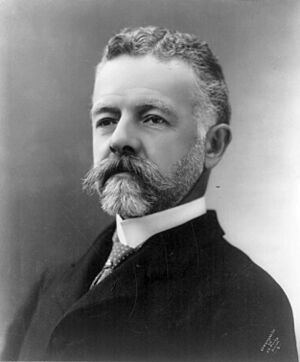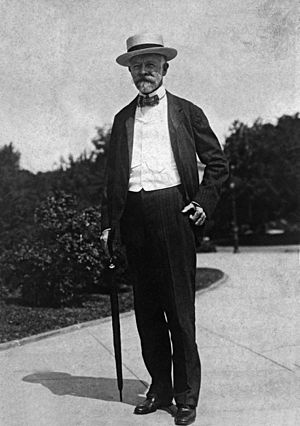Henry Cabot Lodge facts for kids
Quick facts for kids
Henry Cabot Lodge
|
|
|---|---|
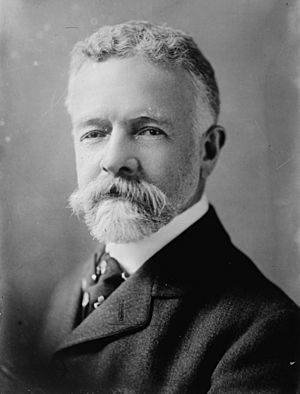
Lodge, c. 1915
|
|
| United States Senator from Massachusetts |
|
| In office March 4, 1893 – November 9, 1924 |
|
| Preceded by | Henry L. Dawes |
| Succeeded by | William M. Butler |
| Chair of the Senate Foreign Relations Committee | |
| In office March 4, 1919 – November 9, 1924 |
|
| Preceded by | Gilbert Hitchcock |
| Succeeded by | William Borah |
| Senate Majority Leader | |
| In office August 17, 1918 – November 9, 1924 |
|
| Deputy | Charles Curtis |
| Preceded by | Position established |
| Succeeded by | Charles Curtis |
| Chairman of the Senate Republican Conference | |
| In office August 17, 1918 – November 9, 1924 |
|
| Preceded by | Jacob Harold Gallinger |
| Succeeded by | Charles Curtis |
| President pro tempore of the United States Senate | |
| In office May 25, 1912 – May 30, 1912 |
|
| Preceded by | Augustus Octavius Bacon |
| Succeeded by | Augustus Octavius Bacon |
| Member of the U.S. House of Representatives from Massachusetts's 6th district |
|
| In office March 4, 1887 – March 3, 1893 |
|
| Preceded by | Henry B. Lovering |
| Succeeded by | William Cogswell |
| Chair of the Massachusetts Republican Party | |
| In office January 31, 1883 – 1884 |
|
| Preceded by | Charles A. Stott |
| Succeeded by | Edward Avery |
| Member of the Massachusetts House of Representatives from the 10th Essex district | |
| In office January 7, 1880 – January 3, 1882 |
|
| Preceded by | Daniel R. Pinkham William Lyon |
| Succeeded by | John Marlor |
| Personal details | |
| Born | May 12, 1850 Beverly, Massachusetts, U.S. |
| Died | November 9, 1924 (aged 74) Cambridge, Massachusetts, U.S. |
| Political party | Republican |
| Spouse |
Anna Cabot Mills Davis
(m. 1871) |
| Children | 3, including George |
| Relatives |
|
| Education | Harvard University (AB, LLB, AM, PhD) |
| Signature | |
Henry Cabot Lodge (May 12, 1850 – November 9, 1924) was an American politician, historian, and statesman. He was a member of the Republican Party from Massachusetts. He served in the United States Senate from 1893 to 1924. He is best known for his views on foreign policy.
Lodge strongly opposed President Woodrow Wilson's plan for the Treaty of Versailles. This treaty would have made the United States join the League of Nations. Because of Lodge's efforts, the U.S. never joined the League. His ideas about the treaty later influenced how the modern United Nations was set up.
He earned four degrees from Harvard University and wrote many history books. Lodge was also a close friend of President Theodore Roosevelt. Their friendship lasted their whole lives.
As a representative, Lodge supported the Lodge Bill in 1890. This bill aimed to protect the voting rights of African Americans. It also wanted to introduce a national secret ballot. As a senator, he focused more on foreign policy. He supported the Spanish–American War and the expansion of American land overseas. He also supported the U.S. joining World War I. Lodge also believed in limiting immigration. He was part of the Immigration Restriction League. His ideas influenced the Immigration Act of 1917.
After World War I, Lodge became the head of the Senate Committee on Foreign Relations. He also led the Senate Republicans. From this position, he fought against Wilson's Treaty of Versailles. He suggested fourteen changes to the treaty. His main concern was that the treaty would force the U.S. to fight in wars without Congress's approval. He worried this would take away power from Congress and reduce American independence. These concerns played a big part in creating the veto power in the United Nations Security Council. Lodge remained a senator until he passed away in 1924.
Contents
Early Life and Education
Henry Cabot Lodge was born in Beverly, Massachusetts. His father was John Ellerton Lodge. His mother was Anna Cabot, from the important Cabot family. He grew up in Beacon Hill in Boston. He also spent time in Nahant, Massachusetts.
In 1872, he graduated from Harvard College. He was part of several clubs there. In 1874, he graduated from Harvard Law School. He became a lawyer in 1875.
A Historian's Work
After traveling in Europe, Lodge returned to Harvard. In 1876, he earned one of the first Ph.D. degrees in history from an American university. His main paper was about "The Anglo-Saxon Land Law." He maintained a lifelong friendship with his professor, Henry Adams.
Lodge became a well-known historian of the United States. He wrote biographies about important figures. These included George Washington, Alexander Hamilton, and Daniel Webster. He also wrote A Short History of the English Colonies in America. In 1898, he published The Story of the Revolution.
In 1878, Lodge was chosen as a Fellow of the American Academy of Arts and Sciences. He also became a member of the American Antiquarian Society in 1881.
Political Career
From 1880 to 1882, Lodge served in the Massachusetts House of Representatives. He then represented Massachusetts in the United States House of Representatives from 1887 to 1893. After that, he served in the United States Senate from 1893 until his death in 1924.
Lodge was reelected many times. In 1911, he faced a tough election. He gave a speech to the state legislature, highlighting his long service. He spoke about his work in civil service reform and expanding the Navy. He also mentioned his efforts to limit immigration. Lodge was reelected by a very small number of votes.
Lodge and Theodore Roosevelt were very close friends. However, Lodge was more conservative than Roosevelt. When Roosevelt left the Republican Party in 1912, Lodge did not join him. Lodge voted for William Howard Taft instead of Roosevelt. After Woodrow Wilson won the election, their friendship continued.
Protecting Voting Rights
In 1890, Lodge helped write the Federal Elections Bill. This bill aimed to protect the voting rights of African Americans. President Benjamin Harrison supported the bill. However, it was stopped by Democrats in the Senate.
In 1891, Lodge became a member of the Massachusetts Society of the Sons of the American Revolution.
Views on Immigration
Lodge strongly supported limiting immigration for several reasons. In the late 1800s and early 1900s, many immigrants came to the U.S. from Eastern and Southern Europe. Lodge believed that too many unskilled workers would lower the living standards for American workers. He also thought that many uneducated immigrants could lead to social problems.
He had strong opinions about different groups of people. In 1891, he wrote that immigration from "the races who have peopled the United States" was decreasing. Meanwhile, he noted an increase in "the immigration of people removed from us in race and blood." He believed that people from Northern Italy were better immigrants than those from Southern Italy. He thought Northern Italians were better educated and more skilled.
Lodge supported "100% Americanism." This was a popular idea at the time. He argued for literacy tests for new immigrants. These tests would help keep out people he considered "most alien to the body of the American people." He thought the U.S. should temporarily stop all new entries. This would allow time to help the millions who had already arrived. From 1907 to 1911, he served on the Dillingham Commission. This group studied immigration and made recommendations. Their ideas led to the Immigration Act of 1917.
World War I and Foreign Policy
Lodge was a strong supporter of the U.S. joining World War I on the side of the Allied Powers. He criticized President Woodrow Wilson for not preparing the military enough. He also accused pacifists of harming American patriotism. On April 2, 1917, the day Wilson asked Congress to declare war, Lodge got into a fight with a pacifist. Lodge later admitted he hit the man first. This is the only known time a U.S. Senator attacked a citizen.
After the U.S. entered the war, Lodge continued to criticize Wilson. He thought Wilson's Fourteen Points were too weak. Lodge believed Germany should be severely punished. He wanted Germany to be crushed militarily and economically. This would prevent it from being a threat again.
Lodge served as chairman of the Senate Foreign Relations Committee from 1919 to 1924. He also led the Senate Republican Conference. Some people consider him the unofficial Senate Majority Leader during this time. He worked with Senator Albert J. Beveridge to push for a stronger U.S. Navy.
The League of Nations Debate
In 1919, Lodge played a key role in the debate over the Treaty of Versailles. This treaty aimed to create the League of Nations. Lodge wanted the U.S. to join the League. However, he wanted changes to the treaty to protect American independence.
Lodge argued that joining the League without changes would weaken American sovereignty. He said, "I have loved but one flag and I can not share that devotion and give affection to the mongrel banner invented for a league."
Lodge also had political reasons for his opposition. He strongly disliked President Wilson. He wanted to give the Republican Party a strong issue for the 1920 presidential election.
Lodge's main problem with the League of Nations was Article X. This article would require all member nations to fight aggression if the League ordered it. Lodge feared this would force the U.S. into wars without Congress's approval. He insisted that Congress must approve any military action.
The Senate had many different views on the treaty. Some Democrats fully supported it. Other Democrats, like Wilson, supported it but opposed any changes. The largest group, led by Lodge, were Republicans. They supported the treaty with changes, especially to Article X. A small group of "irreconcilables" opposed the treaty completely.
It was possible to get a majority of votes for a treaty with changes. However, a two-thirds majority was needed to pass a treaty. President Wilson refused to compromise with Lodge. He would not accept any changes to the treaty.
The Treaty of Versailles went into effect, but the United States did not sign it. The U.S. made separate peace agreements with Germany and Austria-Hungary. The United States never joined the League of Nations.
Lodge's ideas had a lasting impact. His concerns were later included in the United Nations charter in 1945. Article X of the League's charter was removed. The U.S. became a permanent member of the United Nations Security Council with a veto power. Lodge's grandson, Henry Cabot Lodge Jr., later served as the U.S. Ambassador to the United Nations.
In 1922, President Warren G. Harding chose Lodge to be a delegate to the Washington Naval Conference. This conference aimed to reduce naval arms and promote world peace. Nine nations attended, including the United States, Japan, and Great Britain. The conference led to three major treaties. These included the Washington Naval Treaty.
Lodge–Fish Resolution
In June 1922, Lodge introduced the Lodge–Fish Resolution. This resolution showed American support for the British policy in Palestine. This policy was based on the 1917 Balfour Declaration.
Legacy
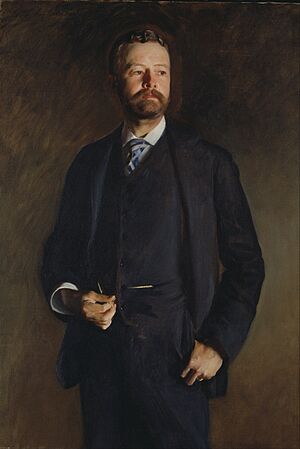
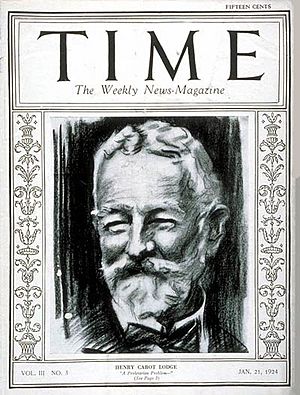
Henry Cabot Lodge served on the Board of Regents of the Smithsonian Institution for many years. He was first appointed in 1890. He served until his death in 1924. The other Regents saw him as a "distinguished colleague." They valued his deep interest and knowledge in the Institution's work.
Mount Lodge, a mountain on the Canada–United States border, was named after him in 1908. This was to honor his work as a U.S. Boundary Commissioner in 1903.
Lodge was played by actor Cedric Hardwicke in the 1944 film Wilson. This movie was a biography of President Wilson.
Personal Life
In 1871, Henry Cabot Lodge married Anna "Nannie" Cabot Mills Davis. She was the daughter of Admiral Charles Henry Davis. They had three children:
- Constance Davis Lodge (1872–1948)
- George Cabot Lodge I (1873–1909), a poet and politician. George's sons, Henry Cabot Lodge Jr. (1902–1985) and John Davis Lodge (1903–1985), also became politicians.
- John Ellerton Lodge II (1876–1942), an art curator.
On November 5, 1924, Lodge had a severe stroke. He was recovering in the hospital from surgery. He passed away four days later at age 74. He was buried in the Mount Auburn Cemetery in Cambridge, Massachusetts.
See also
 In Spanish: Henry Cabot Lodge para niños
In Spanish: Henry Cabot Lodge para niños
- Lodge Committee
 | Anna J. Cooper |
 | Mary McLeod Bethune |
 | Lillie Mae Bradford |


